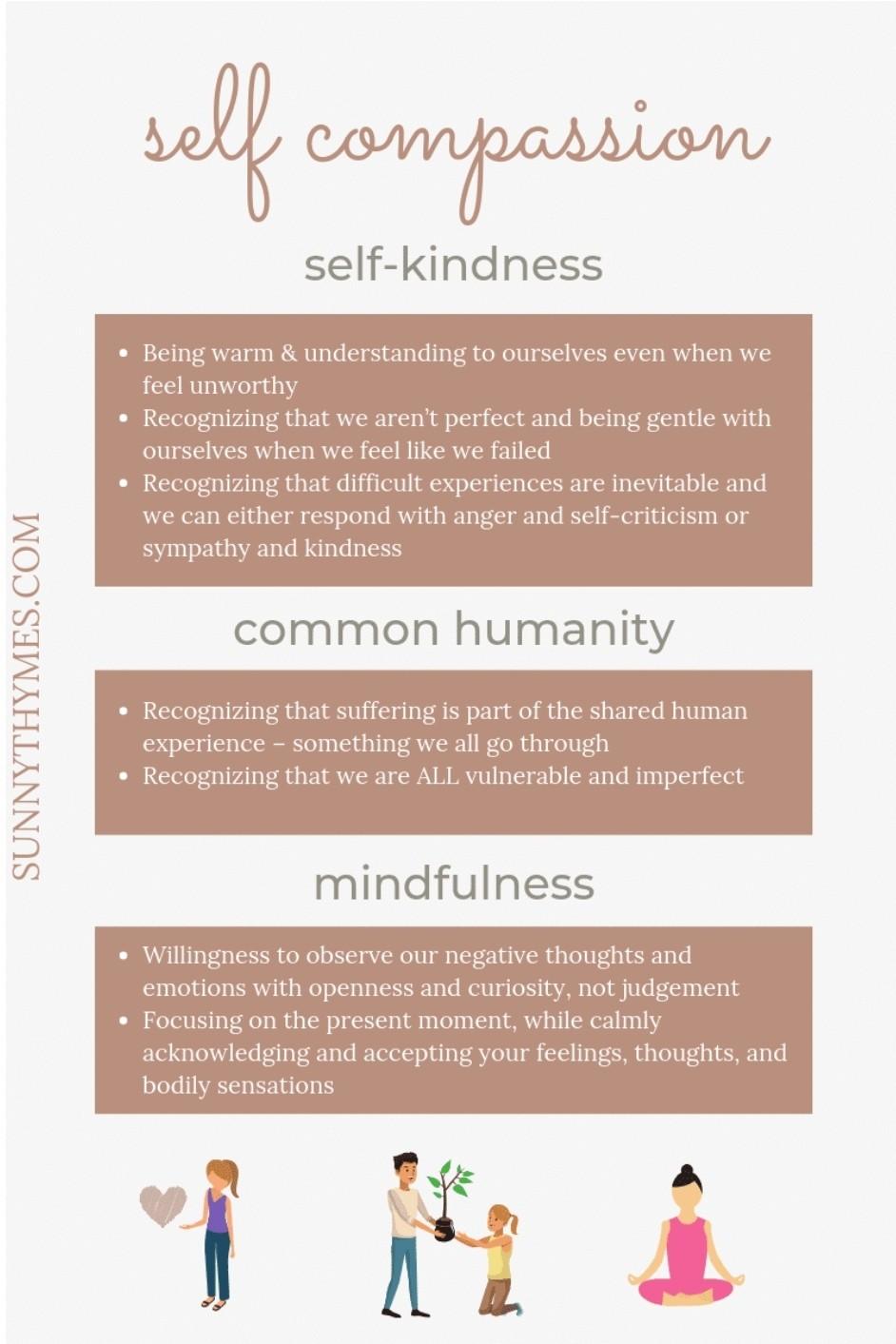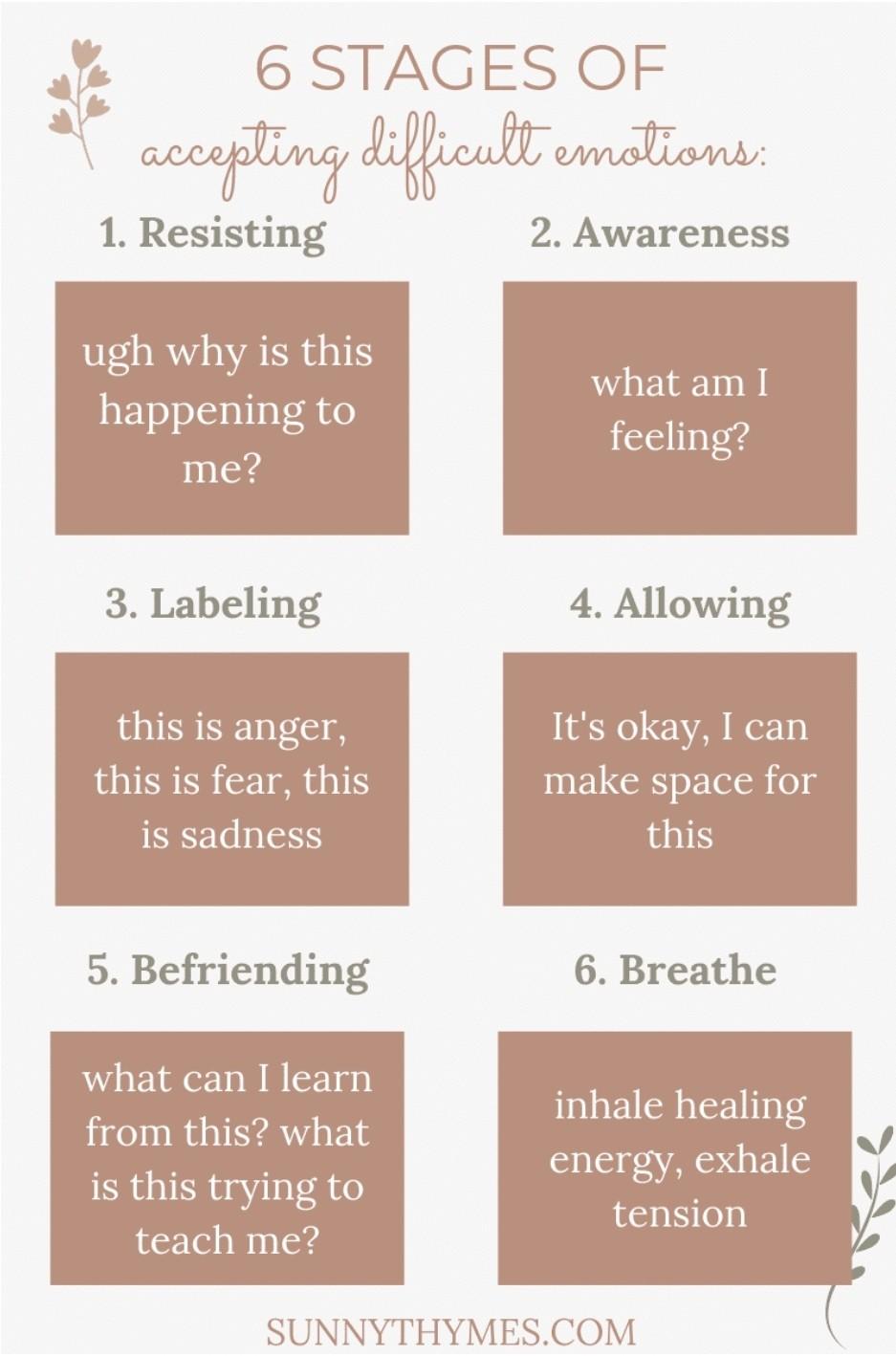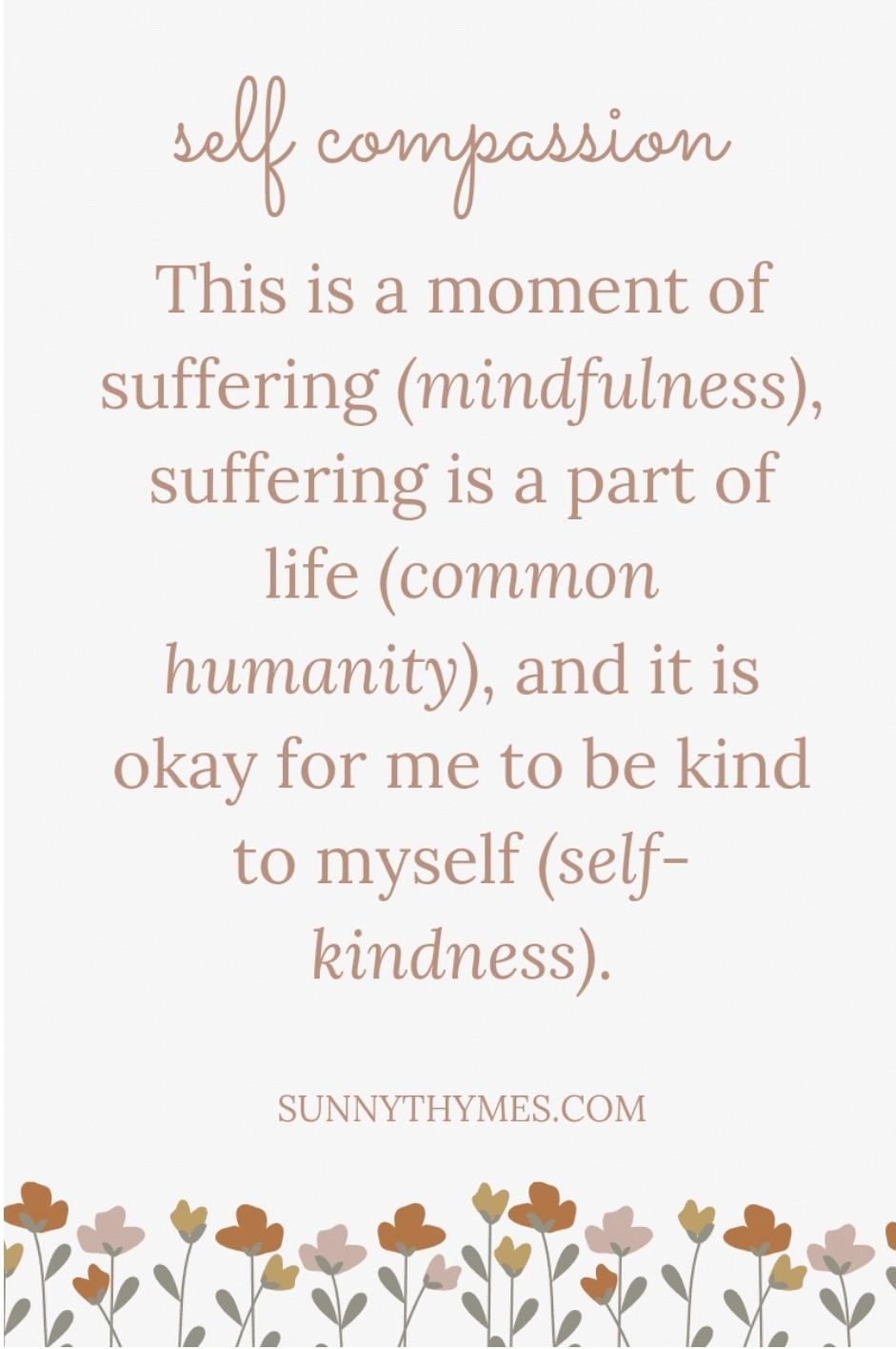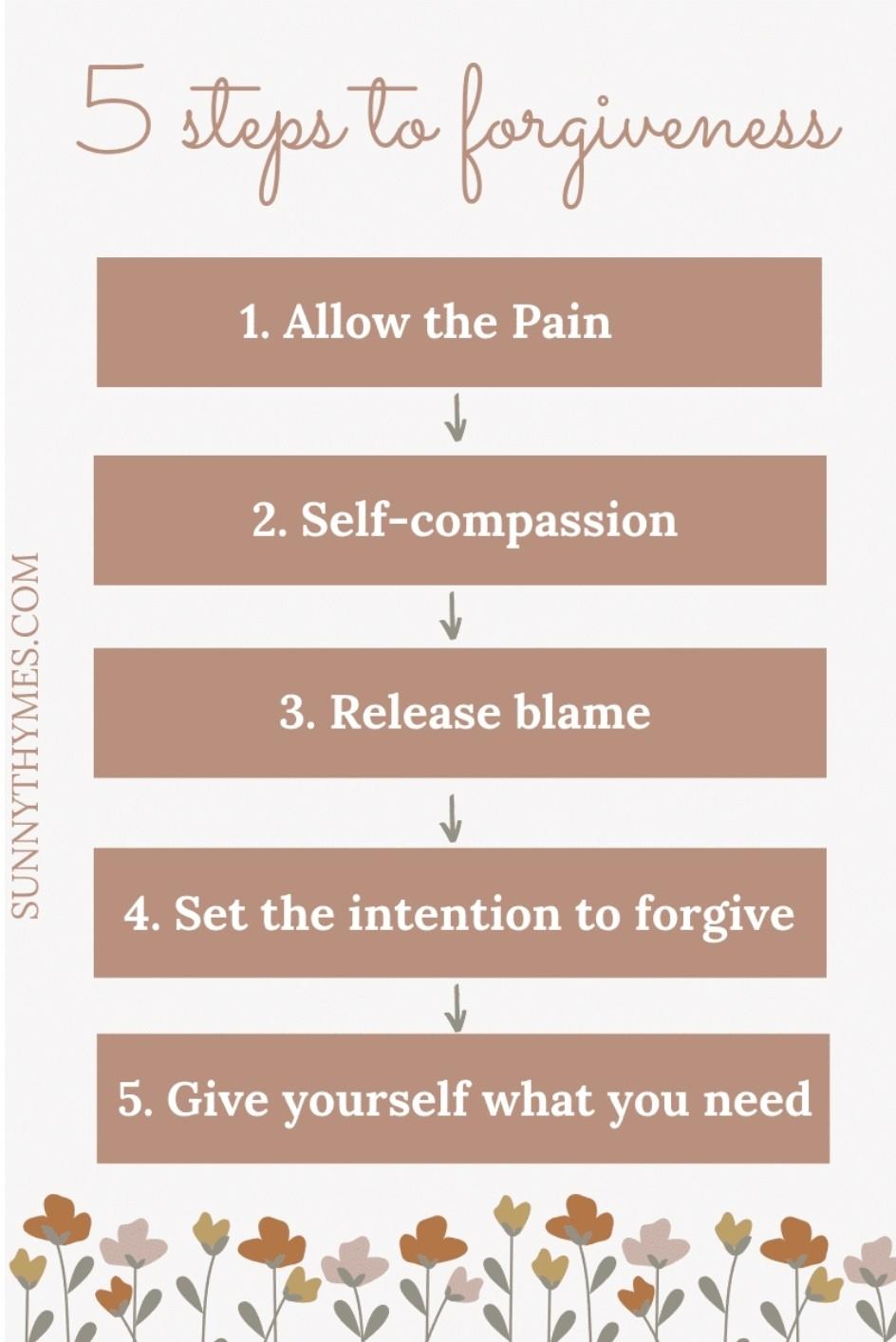7 Ways to Practice Self-Compassion

Is your inner critic the meanest person you know? Do you feel like you might be in an abusive relationship with that voice inside your head? If you’re like, yep, this is so me, keep reading to learn how you can use self-compassion to make friends with your inner critic.

Would you say the same shit you say to yourself to a friend, or your kids, or your partner? Would you tell them they are stupid, ugly, not good enough, a failure, etc?
What if you could have the same level of understanding, care and compassion towards yourself that you have with the people you love? How would that feel? What might your life look like?
Keep reading to find out 🙂
What is self-compassion?
Self-compassion is giving yourself full permission to be exactly as you are. It means honoring and accepting your imperfections and opening your heart to what is, rather than trying to fight it (which is what causes pain and suffering). Self-compassion can help you witness and integrate all parts of yourself to find true self-acceptance. Basically, you know your worth is unconditional and isn’t contingent on your latest accomplishment or failure.
To take it a step further, when you pair that knowing of your worth with self-efficacy (belief in your ability to work through challenges ahead of you), you’re able to accept yourself as you are while also still making progress towards the person you want to be. Because you know you are worthy regardless, you can grow and improve for the sake of seeing what’s possible for you and enjoying the journey (rather than seeking a goal for the sake of becoming more worthy).
Self-compassion is NOT selfish. It’s the same idea as when they tell you to put your breathing mask on first on the airplane….you can’t help others without first helping yourself. There’s nothing to feel guilty about here.
Self-compassion is made up of 3 key elements:
Adapted from Kristin Neff’s self-compassion definition
1. Self-kindness:
- Being warm & understanding to ourselves even when we feel unworthy
- Recognizing that we aren’t perfect and being gentle with ourselves when we feel like we failed
- Recognizing that difficult experiences are inevitable and we can either respond with anger and self-criticism or sympathy and kindness
2. Common humanity
- Recognizing that suffering is part of the shared human experience – something we all go through
- Recognizing that we are ALL vulnerable and imperfect
3. Mindfulness
- Willingness to observe our negative thoughts and emotions with openness and curiosity, not judgement
- Focusing on the present moment, while calmly acknowledging and accepting you feelings, thoughts, and bodily sensations

Benefits of self-compassion
- Associated with grater psychological flexibility which plays a large role in overall psychological well-being (which affects physical well-being and overall health)
- Associated with greater social connectedness, emotional intelligence, happiness, and overall life satisfaction
- Correlated with less anxiety, depression, shame, and fear of failure
- Associated with lower levels of body surveillance, body shame, depression, and negative eating attitudes (which makes it easier to become an intuitive eater and make peace with food and your body)
- Self-compassion can help you develop a healthier relationship with yourself which reflects back in your relationship to everything in your life (partners, money, purpose, work, friends, family, etc)
This list could literally go on forever…..the research on self-compassion is amazing! You can find thousands of other studies here.
7 ways to practice self-compassion

1. Befriend your difficult emotions
Negative emotions aren’t inherently difficult. It’s the meaning we attach to them that makes them painful. We tell ourselves they are bad and that we need to get rid of them. But this only makes us feel worse. We’ve all heard “what you resist persists”, and it’s true.
What if negative emotions weren’t bad? What if they were actually a good thing? What if they are just an alarm going off in our bodies telling us there’s something in our life that needs some compassionate attention?
Instead of resisting, how can we befriend our emotions? Let me take you through my 6 steps of accepting difficult emotions.
6 stages of accepting difficult emotions:
Adapted from Kristin Neff’s Mindful Self-Compassion Workbook
- Resisting: struggling with what comes up for you and wanting to get rid of it, “ugh why is this happening to me? why do I have to feel this way? make it go away.”
- Awareness: getting curious about the discomfort, “what am I feeling?”
- Labeling: labeling your emotions such as “this is anger, this is fear, this is sadness” or labeling your thoughts as “this is just thinking”
- Allowing: gently letting feelings come and go; being with your feelings with curiosity, not judgement, “It’s okay, I can make space for this”
- Befriending: seeing the value in difficult emotions, “what can I learn from this?, what might this feeling be trying to show me or teach me?”
- Breathe: as you inhale, imagine your body filling up with healing energy and as you exhale, imagine all of the tension releasing from your body

2. Journaling
One of the most effective ways to practice self-compassion is journaling. It’s an opportunity for self-exploration and discovery, which is what self-compassion is all about. It can help you get clear on how you’re feeling, work through negative emotions, release stress and anger, transform your beliefs and so much more! There is no one size fits all approach to journaling. You can free write, make lists, follow prompts… whatever feels good to you.
3. Affirmations
Affirmations are one of the easiest ways to practice self-compassion (oh, and did I mention super effective?). Affirmations are positive statements that can help you challenge and overcome self-critical thoughts and beliefs. As you consistently repeat or think them, you start to retrain your brain to believe them, which in turn affects your actions and outcomes you see in your life.
Affirmations are like work outs for the mind (which I’d argue is just as important as physical exercise, or what I like to call joyful movement). Over time, they can help re-program your subconscious mind and beliefs which will help you get into alignment with the life you really want to live.
For example, if you’re someone who believes you are worthy of compassion and taking good care of yourself, your actions will align with that belief because it’s your identity and who you really are. Affirmations can help us take these actions we need in order to become that future version of us that we want to be.
Here are some examples of self-compassion affirmations:
- This is a moment of suffering (mindfulness), suffering is a part of life (common humanity), and it is okay for me to be kind to myself (self-kindness)
- I trust that I will be shown the things that need to change and it will be the perfect opportunity to look at it, sit with it and have compassion for what isn’t serving me anymore – this one is from one of my 1:1 coaching clients 🙂
- I am worthy of infinite and unconditional compassion
- What is within me is more than enough
- Mistakes are proof that I am learning and becoming a better person

4. Meditation
Meditation is probably my favorite way to practice self-compassion. It can help you create space between a vulnerable experience (like seeing yourself in the mirror) and a self-harming reaction (like engaging in dieting behaviors). This space created allows you to notice what is going on with compassion and curiosity, pause and then respond thoughtfully.
There is no right way to practice meditation. You don’t need crystals, perfect lighting, candles, etc (but if that feels good for you, go for it). You can sit or lay down. You can have your eyes open or closed. You can be still or do a walking meditation. It’s totally up to YOU.
Meditation isn’t about “emptying the mind”, “clearing the mind,” or “stopping thoughts.” The mind’s nature is to think. We meditate to see those thoughts more clearly. Seeing our thoughts more clearly allows us to more easily accept them. And as we become more accepting of our thoughts, we become more self-compassionate.
5. Forgiveness
The ability to forgive yourself is a critical component of practicing self-compassion. When we constantly beat ourselves up and resist forgiveness, the anger and guilt gets stored in our bodies and can show up as physical or emotional pain.
These 5 steps will help you work through letting go of and releasing shame so you can forgive yourself. These strategies work well for forgiving others too, but for our purposes, we’re going to talk about forgiving ourselves.
5 steps to forgiveness
- Allow the pain: Allow yourself to feel the pain, guilt and associated sensations in your body
- Self-compassion: Recognize that making mistakes and feeling guilty is part of being human, offer yourself compassion “I do the best I can in any given moment”
- Release blame: What triggered you to treat this person or yourself in a way that you aren’t proud of? Were you really stressed? Were your buttons pushed? What else could have impacted the way you acted?
- Set the intention to forgive: Practice this affirmation “I am choosing to forgive myself for what I have done”
- Give yourself what you need: What would you say to yourself in that moment if you could go back? Tell that to yourself now. Learn and let go.

Download my free forgiveness meditation here!
6. Gratitude
Gratitude is about recognizing and appreciating the good in your life and also the good that is to come in the future. The more you focus on what you’re grateful for, the less room there will be to focus on self-criticism, negative thoughts or judgements.
One of the easiest ways to develop the practice of gratitude is to write down 3-5 things you are grateful for every morning or night. Over time you’ll start to notice it becomes more of a habit for you throughout the day. When we’re grateful for what we already have and what is to come, we give off (and feel) high vibe energy which attracts more of what we want in our lives. Instead, if we complain about what we don’t have, we give off negative vibes which creates resistance and closes us off from creating more of what we want.
7. Work with a supportive coach
There is NO SHAME in asking for help. It is HARD to cultivate new thought patterns, beliefs and behaviors on our own. Coaches provide a safe space and an opportunity for you to be heard. They help you uncover what’s really going on and support you in discovering and implementing your own solutions.
I hope you’ll use these strategies to help you cultivate infinite and unconditional self-compassion. Which one is your favorite? Let me know in the comments below!
Rise & Align, In Your Inbox
A weekly pause to breathe, reflect, and realign—because sometimes, all you need is a moment to slow down and come back to center.
